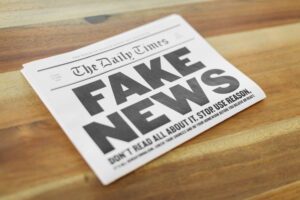[ad_1]
 Edward C. Chung wanted to drive home his concern that Chevron (and some other entities) might skip out on an $18 billion arbitration award. To bolster his case, he sought to enter a Saudi Sun news article into the record for “demonstrative purposes.” What it demonstrated was creative writing, because the article was phony.
Edward C. Chung wanted to drive home his concern that Chevron (and some other entities) might skip out on an $18 billion arbitration award. To bolster his case, he sought to enter a Saudi Sun news article into the record for “demonstrative purposes.” What it demonstrated was creative writing, because the article was phony.
Brings “fake news” to a whole new level, doesn’t it?
The court sanctioned Chung to the tune of $268K.
Chung wrote a letter to the court describing the article as a “hypothetical paper” which didn’t assuage the Ninth Circuit’s ethical concerns. It probably didn’t help that Chung also…
…accused two 9th Circuit judges of “an obvious abuse of judicial authority, corruption and collusion between you, Chevron Corporation and its counsel of record, Gibson, Dunn & Crutcher.”
Then he didn’t show up for the sanctions hearing and questioned whether or not the judge actually signed the sanctions order given “so many profound oddities, threats and misrepresentations made in this case by Chevron and their counsels….”
He could’ve just recounted the Steven Donziger story if he wanted to convey how oil companies don’t like paying legal debts incurred for what they do in other countries.
While this fake article was a “hypothetical,” there’s a very real risk that artificial intelligence will land more lawyers in this sort of ethical quandary. Caselaw hallucinations get all the press, but they’re likely to soon become a thing of the past as trusted caselaw archivists offer AI-driven functionality.
But seeking out newspaper accounts or non-legal academic support won’t necessarily have those guardrails. Those are the exhibits that lawyers are going to query a consumer-facing AI to compile and it’s going to spit back a plausible but entirely fake article.
You can already see some partner asking a junior to compile factual support and the associate asking ChatGPT or BART or, saints preserve them, Grok to find some articles. And while lawyers might be more cautious with court filings, there are tons of less significant junctures for fake articles to wend their way into legal work. The SEC sends a client a polite letter asking them to justify charging the company to build an elite security detail for its CEO. So the lawyers put together accounts of other executives being kidnapped and sends over a realistic looking account of terrorists seizing Nakatomi Plaza.
Next thing you know, agent Johnson and agent Johnson — no relation — are investigating the firm for lying to the government.
Lawyers often forget the non-legal secondary sources that impact legal work, but they’re out there and AI resources aren’t moving nearly as quickly to tamp down on those. Be careful out there.
Judge sticks with $268K sanction for fake news article lawyer filed with appeals court [ABA Journal]
 Joe Patrice is a senior editor at Above the Law and co-host of Thinking Like A Lawyer. Feel free to email any tips, questions, or comments. Follow him on Twitter if you’re interested in law, politics, and a healthy dose of college sports news. Joe also serves as a Managing Director at RPN Executive Search.
Joe Patrice is a senior editor at Above the Law and co-host of Thinking Like A Lawyer. Feel free to email any tips, questions, or comments. Follow him on Twitter if you’re interested in law, politics, and a healthy dose of college sports news. Joe also serves as a Managing Director at RPN Executive Search.
[ad_2]





